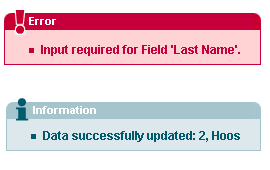| Attribute | Type | Description | Req. | RTExp |
| caption | String |
The main title of the form.
The title and detail can also be specified together in the form "title - detail. |
 |
|
| detail | String | The detail title of the form. |
 |
|
| filter | boolean | The automatic HTML coding of the column contents can be activated or disabled with the filter-attribute. |
 |
|
| formid | String |
The unique identification of the form.
It is written in the form as a hidden field with the name formid
and is thus available at the time of a form submission. The framework
can call the corresponding EventHandler via the formid.
|
 |
 |
| hideButtons | String list |
This attribute can be used to hide some of the buttons.
The buttons needs to be specified within a semicolon separated list.
Annotation: A semicolon separated list. The button names must match values of ControlButton.getName() |
 |
|
| name | String |
Specifies the name of the Java-Bean.
The Java-Bean must be stored in the given scope.
When the tag is surrounded by a Struts <html:form> tag, no Bean Name need be specified. In this case, the Java-Bean is drawn via a property of the Struts Form Bean. Annotation: A valid Java identifier must be given. |
 |
|
| permission | ACL |
With this attribute, access to the element can be restricted.
Authorizations are checked using the com.cc.framework.security.Principal object in the user session. The principal object is registered in the session with the method com.cc.framework.security.SecurityUtil#registerPrincipal(HttpSession, Principal). It is made available by the application developer by implementing the principal interface. In this manner, any authorization system can be very easily connected within the framework. Authorizations are always specified in the form of an Access Control List (ACL). What is involved here is a semicolon-delimited list with individual authorizations. The framweork supports the following authorization types, which, however, can be expanded at will by the application developer:
|
 |
|
| property | String |
Specifies the name of the property using which the Java-Bean
is to be accessed. This is generally only necessary when
the Java-Bean is associated with a Struts Form Bean.
Annotation: A valid Java identifier must be given. |
 |
|
| severity | Severity |
Specifies the error class of the message form.
The appearance of the form is influenced by the error class.
|
 |
 |
| style | String |
An HTML-style can be directly specified with this attribute.
Annotation: See HTML documentation for the attribute style. |
 |
|
| styleClass | String |
The HTML-class attribute of the element can be specified with this attribute.
Annotation: See HTML documentation for the attribute class. |
 |
|
| styleId | String |
The HTML-id attribute of the element can be specified with this attribute.
Annotation: See HTML documentation for the Attribute id. |
 |
|
| width | String |
Specifies the width of the form window. The height may be
specified in absolute or percent terms.
See HTML-Documentation |
 |
